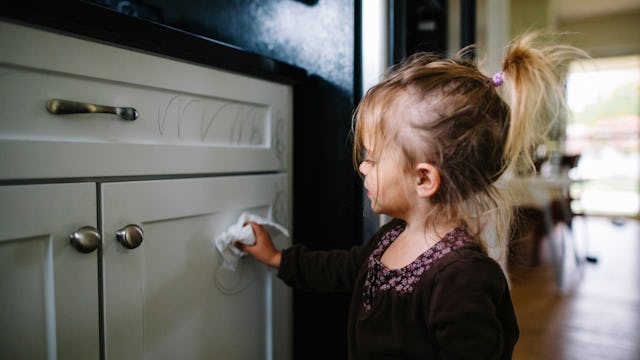I Used To Spank My Child, But This Is Why I Stopped

I grew up in the heart of spanking culture, in a southern, small town.
As a child, I knew that if I was gonna do something naughty, I’d better be sneaky or prepare to pick my own switch. I didn’t find myself in the hot seat very often, but I have very intense memories of the few times I did. I remember walking the long, Green Mile to my room in fear, stuffing my pajamas with washcloths, and covering my butt with my hands while screaming for a last second reprieve. Honest to God, the memories make me sick to my stomach.
I never considered the impact spanking had on me, until I was a new mother. It was my first night home from the hospital with my baby boy, and I had been in the rocking chair for hours. There he was, a seven pound human, snoring quietly against my chest. In that moment, I was struck by how profoundly helpless this baby was in my arms, and what an incredible responsibility motherhood was going to be. I still can’t tell you where it came from, but as the tears streamed down my face, I leaned in and whispered, “Mommy will never lay a hand on you, I promise.”
Three years later, I spanked my son for the first time.
It just happened one day–a visceral reaction to him running into the street. In the heat of the moment, I grabbed his arm and struck his butt. I can clearly remember the look on his face: confusion, anger, and betrayal. I instantly justified the choice in my mind because this is what parents are supposed to do, right? Tough love, even when it feels wrong?
I had heard “this hurts me more than it hurts you” enough to actually believe it. So, even though every fiber of my being hated it, a standard was set, and I continued to physically discipline my son.
His behavior didn’t improve by spanking. In fact, it worsened. My boy was physically escalating conflicts, and one particular day, he lashed out and hit his little sister. I was so horrified that my son would do that, and I raised my voice to let him know it.
“We do NOT hit in this family, son. You know better!”
With tears in his eyes, my son gritted his teeth and yelled back, “But Mommy, you hit me!”
My son was right…and it broke my heart. That was the first time I was confronted with the logical fallacy of spanking. I comforted my son until he scampered back to whatever toy he had been playing with, but for the rest of the day there was a heavy feeling in my gut, and growing conviction that what I had done to my child was wrong. Deeply wrong.
That evening, when my husband got home, we had a long heart-to-heart. Even though we were both raised in spanking households, it wasn’t something we intended to do with our own children. Spanking was something we fell into by default, because we never had another game plan. After a long discussion, we discovered that it never felt right for either of us and that, in fact, we both felt it was abusive. We were heartbroken, and committed to doing better.
We spent that evening researching the long-term impacts of different forms of discipline, something we both wish we had done sooner. We discovered that the scientific community agrees that spanking is not only ineffective, but also harmful. That the large body of evidence proves that physical punishment — including spanking, hitting, and other means of causing pain — can lead to increased aggression, antisocial behavior, and even mental health problems for children.
It’s a tough pill to swallow, knowing that you’ve harmed your child in a very real way. Especially when you thought that what you were doing was for their benefit. I always assumed that my cultural and moral justifications for spanking were enough. But the whole premise fell apart when I looked at physical punishment, logically. Later that evening, I stumbled across an anonymous quote that put all of my feelings about spanking into words. It simply said this:
“Is the child old enough to understand reason? Yes? Then reason with them. No? Then they’re not old enough to understand why you’re spanking them.”
The truth is, it never made sense to hit my child; it was just something I had always known. And well, “my parents did it” isn’t a very good justification for abuse.
My husband and I agreed, it was time to break the cycle.
That evening, I tip-toed into my son’s room and kissed his forehead. He was already asleep, and though his cheeks had thinned significantly over the years, he still had that cherub-like appearance I remembered from his newborn days. I ran my fingers through his curly hair and leaned in to whisper in his ear.
“I promise you, son. Mommy will never lay a hand on you, again.”
And this time, I kept my promise.
This article was originally published on